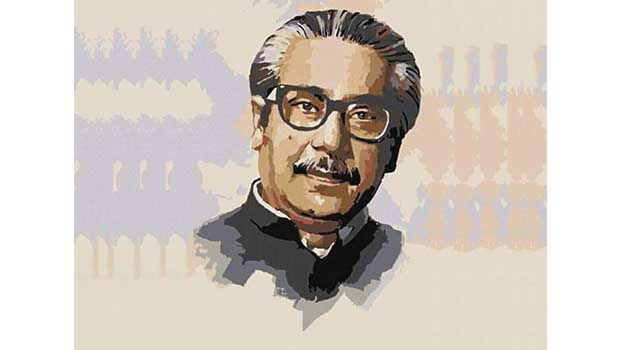The epic reflector of Bengali heritage


The nation observed the National Mourning Day on Saturday with due reverence and solemnity, marking the 45th anniversary of assassination of Father of the Nation Bangabandhu Sheikh Mujibur Rahman.
On August 15, 1975, some misguided members of the army killed Bangabandhu and his family members at their Dhanmondi residence. The assassins killed Bangabandhu's wife Bangamata Begum Fazilatunnesa Mujib, Bangabandhu's children Sheikh Kamal, Sheikh Jamal, young Sheikh Russell and daughter-in-law Sultana Kamal and Rosi Jamal.
Bangabandhu's younger brother Sheikh Nasser, brother-in-law Abdur Rab Serniabat, his son Arif, daughter Baby, Bangabandhu's nephew Sukant Babu, liberation war organiser Sheikh Fazlul Haque Moni, his pregnant wife Arju Moni and Abdul Naum.
The call for independence made by Bangabandhu in his historic speech at Suhrawardy Udyan on March 7, 1971, after a long 24-year struggle against Pakistani rule and exploitation, is unforgettable. Millions of oppressed Bengalis jumped into the war of independence with the immortal call of 'This time the struggle is for our liberation /this time the struggle is for freedom'. With that mantra, Bengalis became a fighting nation.
After the most brutal genocide in history on the night of March 25, 1971, even in the early hours of March 26, the nation heard the immortal declaration of great independence in Bangabandhu's voice. The Pakistani invaders arrested Bangabandhu that night and took him away from his residence in Dhanmondi. After that he was imprisoned in Pakistan for nine months of the great liberation war.
The war of liberation went on at his call. Despite the news of his death in captivity, this fearless leader did not compromise on the question of freedom. At the end of the war of liberation, Pakistan was forced to return the beloved leader of the Bengalis. In the guise of a hero, Bangabandhu returned to his dream independent Bangladesh on January 10, 1972.
Returning to the country, Bangabandhu engaged himself in the task of rebuilding the war-torn country as well as involved the people of the country in the trend of development. He was convinced that the people of his country would never forget his sacrifice and contribution in the struggle for national unity.
Bangabandhu, the newly formed head of state of Bangladesh, therefore used to live in the ordinary house on Dhanmondi Road No 32 instead of the official residence.
The conspiracy of the defeated evil forces of the war of liberation did not stop. They were getting trapped in one conspiracy after another to avenge the defeat. The conspirators used a few misguided and ambitious members of the army on August 15, 1975 to turn conspiracy into reality. They attacked house No 32 in Dhanmondi, known as the birthplace of independence, late at night. Father of the Nation Bangabandhu Sheikh Mujibur Rahman and his family were killed.
Through this heinous and brutal massacre in the history and human civilisation, they wanted to kill not only Bangabandhu but also the greatest ideals of independence achieved by the Bengalis for a thousand years. Attempts were also made to erase the history of Bengali heroism.
Bangabandhu's murderer Khandaker Mushtaq’s government had issued the infamous 'Indemnity Ordinance' to prevent the murder trial. However, after 21 years, when Awami League led by Bangabandhu's daughter Sheikh Hasina came to power in 1996, the 'Indemnity Ordinance' was repealed, the way was paved for the trial of Bangabandhu's assassination. Father of the Nation Bangabandhu Sheikh Mujibur Rahman is an inspiration to the youth.
To the youth, he is a symbol of life struggle, struggle against injustice. He had a liberal personality, was a successful politician of non-communal Bangladesh. Even if we all follow different ideologies, there is no room for dissent from the fact that freedom is synonymous with the very name ‘Bangabandhu’. He undoubtedly was an uncompromising leader of the freedom movement for the oppressed and downtrodden people of the world.
In particular, he was the originator of Bengali nationalism; he was vocal in advocating for the rights of oppressed peoples in Afro-Asia and the Third World. We also know from history that he has supported the Palestinian people and their independent state on the world stage. He was a strong voice against imperialism and hegemony.
Nonetheless, Bangabandhu Sheikh Mujibur Rahman set a unique and important precedent in the international arena by lecturing in his mother tongue Bengali at the United Nations on Wednesday, September 25, 1974. At 4 am Bangladesh time, the UN General Assembly unanimously adopted Bangladesh as the 136th member state of the United Nations.
Eager to hear this announcement, Bangabandhu immediately responded by saying, ‘I am happy that Bangladesh has got its fair share in the UN.
Every year on August 15, the government undertakes various programmes to observe the day in a dignified and solemn atmosphere across the country. In separate messages, Abdul Hamid and Prime Minister Sheikh Hasina pray for the forgiveness of the souls of all the martyrs of August 15, including Bangabandhu Sheikh Mujibur Rahman.
With the National Mourning Day in mind, various socio-cultural and political organisations including Awami League and allied organizations had been holding various programs since the first day of this month.
Bangabandhu’s assassination was horrific for a newly independent country. None could understand the language and feelings of the heart of Bengalis more than him. He was the epic reflector of Bengali heritage and culture.
Wadia Ayshi is a student at the Department Of English In University Of Dhaka.


